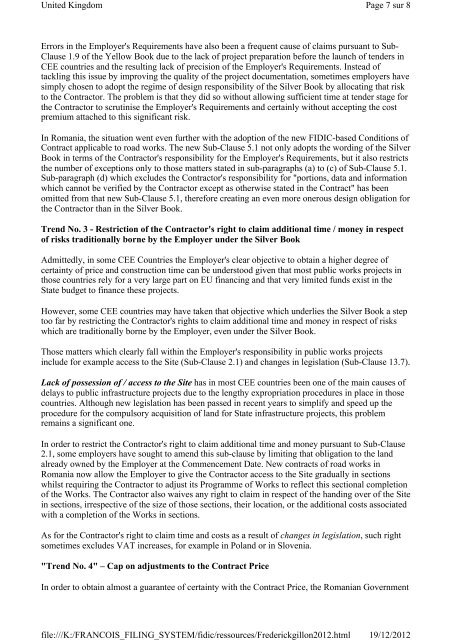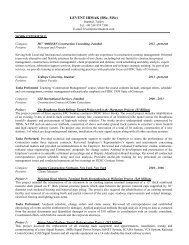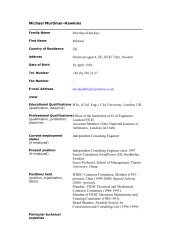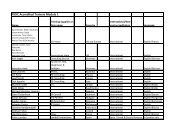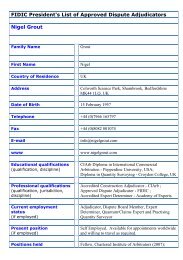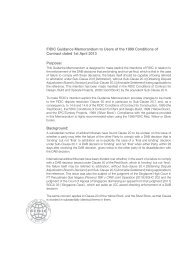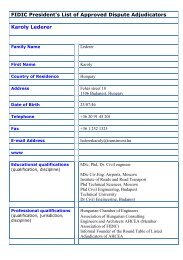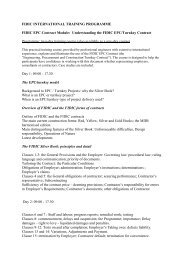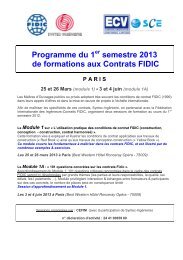United Kingdom: Use And Misuse Of FIDIC Forms Of Contract In ...
United Kingdom: Use And Misuse Of FIDIC Forms Of Contract In ...
United Kingdom: Use And Misuse Of FIDIC Forms Of Contract In ...
You also want an ePaper? Increase the reach of your titles
YUMPU automatically turns print PDFs into web optimized ePapers that Google loves.
<strong>United</strong> <strong>Kingdom</strong>file:///K:/FRANCOIS_FILING_SYSTEM/fidic/ressources/Frederickgillon2012.htmlPage 7 sur 819/12/2012Errors in the Employer's Requirements have also been a frequent cause of claims pursuant to Sub-Clause 1.9 of the Yellow Book due to the lack of project preparation before the launch of tenders inCEE countries and the resulting lack of precision of the Employer's Requirements. <strong>In</strong>stead oftackling this issue by improving the quality of the project documentation, sometimes employers havesimply chosen to adopt the regime of design responsibility of the Silver Book by allocating that riskto the <strong>Contract</strong>or. The problem is that they did so without allowing sufficient time at tender stage forthe <strong>Contract</strong>or to scrutinise the Employer's Requirements and certainly without accepting the costpremium attached to this significant risk.<strong>In</strong> Romania, the situation went even further with the adoption of the new <strong>FIDIC</strong>-based Conditions of<strong>Contract</strong> applicable to road works. The new Sub-Clause 5.1 not only adopts the wording of the SilverBook in terms of the <strong>Contract</strong>or's responsibility for the Employer's Requirements, but it also restrictsthe number of exceptions only to those matters stated in sub-paragraphs (a) to (c) of Sub-Clause 5.1.Sub-paragraph (d) which excludes the <strong>Contract</strong>or's responsibility for "portions, data and informationwhich cannot be verified by the <strong>Contract</strong>or except as otherwise stated in the <strong>Contract</strong>" has beenomitted from that new Sub-Clause 5.1, therefore creating an even more onerous design obligation forthe <strong>Contract</strong>or than in the Silver Book.Trend No. 3 - Restriction of the <strong>Contract</strong>or's right to claim additional time / money in respectof risks traditionally borne by the Employer under the Silver BookAdmittedly, in some CEE Countries the Employer's clear objective to obtain a higher degree ofcertainty of price and construction time can be understood given that most public works projects inthose countries rely for a very large part on EU financing and that very limited funds exist in theState budget to finance these projects.However, some CEE countries may have taken that objective which underlies the Silver Book a steptoo far by restricting the <strong>Contract</strong>or's rights to claim additional time and money in respect of riskswhich are traditionally borne by the Employer, even under the Silver Book.Those matters which clearly fall within the Employer's responsibility in public works projectsinclude for example access to the Site (Sub-Clause 2.1) and changes in legislation (Sub-Clause 13.7).Lack of possession of / access to the Site has in most CEE countries been one of the main causes ofdelays to public infrastructure projects due to the lengthy expropriation procedures in place in thosecountries. Although new legislation has been passed in recent years to simplify and speed up theprocedure for the compulsory acquisition of land for State infrastructure projects, this problemremains a significant one.<strong>In</strong> order to restrict the <strong>Contract</strong>or's right to claim additional time and money pursuant to Sub-Clause2.1, some employers have sought to amend this sub-clause by limiting that obligation to the landalready owned by the Employer at the Commencement Date. New contracts of road works inRomania now allow the Employer to give the <strong>Contract</strong>or access to the Site gradually in sectionswhilst requiring the <strong>Contract</strong>or to adjust its Programme of Works to reflect this sectional completionof the Works. The <strong>Contract</strong>or also waives any right to claim in respect of the handing over of the Sitein sections, irrespective of the size of those sections, their location, or the additional costs associatedwith a completion of the Works in sections.As for the <strong>Contract</strong>or's right to claim time and costs as a result of changes in legislation, such rightsometimes excludes VAT increases, for example in Poland or in Slovenia."Trend No. 4" – Cap on adjustments to the <strong>Contract</strong> Price<strong>In</strong> order to obtain almost a guarantee of certainty with the <strong>Contract</strong> Price, the Romanian Government


